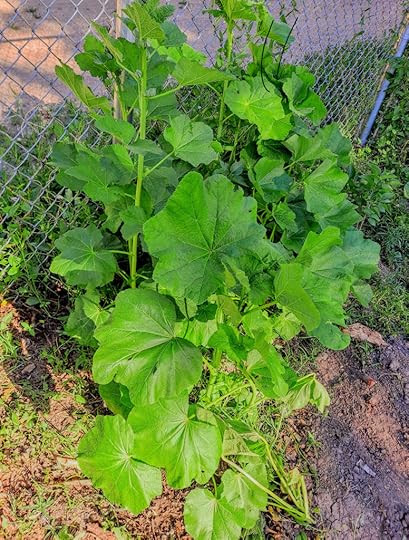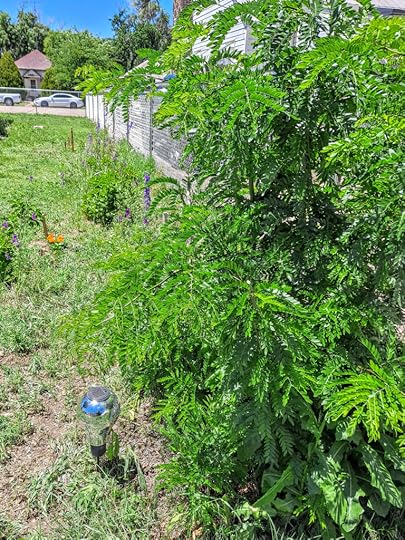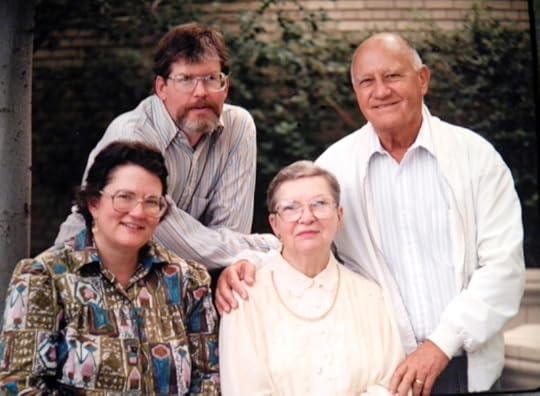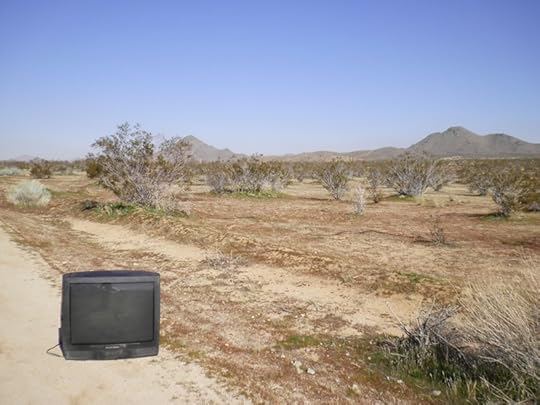Pat Bertram's Blog, page 58
June 8, 2021
A Small House and a Large Garden

A friend sent me a verse written in the seventeenth century by poet Abraham Cowley:
May I a small house and large garden have;
And a few friends,
And many books, both true.
No wonder she thought of me when she saw that snippet — it seems to describe my life perfectly. A small house, a large garden (not quite yet, but in the making!), a few true friends, and many books, though too few of those books, perhaps, are true. Actually, I don’t own many books except those I wrote, a few reference tomes, some tarot books, and quite a few alchemical texts that I have yet to study. Most of my “many books” are in the library that is a mere four blocks from my small house. As long as I can manage to get there, all those books belong to me. In fact, when I was there earlier today, the only person in the building besides me was the librarian. So, not just a private library all my own, but a personal librarian to take care of all my books!
On the way back from the library, I picked up another two plants for my ever-expanding garden. I was going to say ever-growing, but too many plants haven’t started to flower or even spread. My hanging lobelia is doing fine, though.
And so, of course, are the weeds.
When I returned from my errands, I took the time to mow the weedy lawn. Workers are supposed to come later this week, and I thought it might be a good idea if they could actually see where they needed to work. Of course, my having done the job pretty much guarantees that they won’t come, so I suppose it would have been smarter to leave everything the way it was. But then, if I waited too long, the mower wouldn’t have been able to cut the weeds. As it is, there are a couple of very tall, very tough patches of grass that defeated the mover. It seems as if next on my shopping list will be grass clippers.
I paused here to look up battery operated grass clippers and found one that might be a fun and useful tool to have to help me create my “large garden.” Now I know how I will spend my next paycheck!
***

Pat Bertram is the author of Grief: The Inside Story – A Guide to Surviving the Loss of a Loved One. “Grief: The Inside Story is perfect and that is not hyperbole! It is exactly what folk who are grieving need to read.” –Leesa Healy, RN, GDAS GDAT, Emotional/Mental Health Therapist & Educator
June 7, 2021
At War With Weeds
The weeds are definitely winning the war in my yard. For every one that I manage to eradicate, another three take its place. I don’t want to go the poison route — with more weeds than anything else here on this property, the amount of weedkiller necessary to do the job would probably be strong enough to kill me, too.
So, it’s one weed at a time, though I have been mowing some of them just to clear a space for me to walk.
Oddly, some of those that seemed the most innocuous have turned out the be the most frightening. Since I can’t dig up all of them, I’ve started with those that have seed pods similar to dandelions, because once those take hold, you never get rid of them. I’ve pretty much been ignoring a weed that seemed to have a shallow root system, with skinny “arms” and sparse leaves, that lays flat on the ground. I thought that with all the wind around here, it might not be a bad idea to leave those weeds be so that they could hold the soil in place.

Bad idea! Today when I was out weeding one of my garden patches, I went ahead and pulled up some of those weeds, which turned out to be a monumental task. Each one of those “arm” had grown to about two feet, and at each intersection where a leaf grew, the plant grew a root. Even worse, in some cases, it tied down plants that were in its way. I’d never seen anything like that. I thought bindweed was bad. Bindweed looks like miniature white morning glories, and if they are in a field, they lie flat and look pretty. If they are in a garden, they grow monstrously long and strangle any plant they can climb. Unless I want to resort to poison, the bindweed will always win, but I can sort of keep on top of it. Goat’s head is another plant that is prevalent around here, but I know what it is, and can — mostly — keep on top of that one, too. But this long, skinny plant that ties itself to the ground and to anything in its path is something else again.
I have no idea what the plant is called — I spent the past hour searching online for information about it without any luck — but I do know I have to be more vigilant about pulling it up. If not, I’ll wake up one day and find my whole house wrapped up in the tendrils of that weed.
*Shivering*
The thought is enough to give me nightmares.
***

What if God decided S/He didn’t like how the world turned out, and turned it over to a development company from the planet Xerxes for re-creation? Would you survive? Could you survive?
A fun book for not-so-fun times.
Click here to buy Bob, The Right Hand of God.
June 6, 2021
Then More Stuff Happens

We live in an strange literary climate where books published by small independent publishers are held to a higher standard than anything published by one of the handful of major publishing houses.
I’m currently reading a book published by one of the major companies, and nothing happens. Well, that’s not exactly true. Stuff happens. Then more stuff happens. And even more stuff happens. But I am now three-quarters of the way through the book, and all I’ve gleaned from the story is that a lot of stuff happens.
But nothing happens to move the story forward. I presume all this “stuff” — murders, crooks double-crossings, political shenanigans, human trafficking — will lead to a cohesive ending, but I’m not sure if I will ever know what happens. For one thing, the story is too convoluted with at least a dozen point-of-view characters, mostly criminals, and I haven’t sorted all of them out yet. (A serious problem is that too many names are closely related, like Donnie and Danbury and Donaldson). So even if I read to book to the end, chances are I won’t know the whole of it. And for another thing, I’m ready to give up. I really don’t care to read about women (and men) crime bosses and gambling and prostitution and all sorts of other nefarious behavior gotten up to by the bad guys. There has to be at least an equal amount of action by the so-called “good guys,” but so far, I haven’t identified any good guys.
I do know that any such book written by an unknown and published by an independent company would have been panned by any readers, not acclaimed as “gripping,” and “raucous” and “unflinching” and “exceptional.” Though, come to think of it, those are rather namby-pamby words to describe a bestseller, as if even the reviewers had a hard time coming up with something good to say about this book. Actually, looking more closely at the reviews, they seem to be about the series as a whole rather than this particular book, so perhaps the reviewers couldn’t finish it, either.
Although it might seem like it, I’m not really picking on this book, just using it as an example of today’s literary climate. Another book I recently finished by a bestselling author who has been around forever, read like a junior high school kid’s attempt at writing a novel, with way too much repetition and explaining, and way too little in the way of characterization. Still, that book made some sort of sense. Stuff happened, but that stuff seemed to tie into the main storyline.
I suppose I have to take the reader (me) into consideration. I have read so many books (about one a day) for so many decades that I could be a tad jaded.
***

Pat Bertram is the author of Grief: The Inside Story – A Guide to Surviving the Loss of a Loved One. “Grief: The Inside Story is perfect and that is not hyperbole! It is exactly what folk who are grieving need to read.” –Leesa Healy, RN, GDAS GDAT, Emotional/Mental Health Therapist & Educator
June 5, 2021
Stumped by a Stump
Shortly after I moved here, I had to have a Siberian elm tree cut down because it was interfering with the electric lines. Unfortunately, Siberian elms are tenacious creatures, and because the stump had never been ground out, the tree stump kept shooting up branches. I sure got tired of pruning that tree! Even worse, for every branch I cut, another half dozen would grow. Last fall, the workers who occasionally stop by to continue with a task they’d abandoned months previously, came back to try to dig out the stump. They told me they’d cut off all the roots that snaked off the main trunk, which should have made it easy to pry up the stump. Not so. They eventually abandoned the project — again — until they could arrange for a stump grinder, as well as schedule others with stumps needing removal to make the price of the equipment more affordable for all of us.
We thought that since that stump had been so mangled, it would die on its own, but that didn’t happen. In fact, this year, the thing grew even more voraciously than it did the previous year. I wasn’t too worried because the stump grinder was finally scheduled to be rented, though as always when it comes to my property, things weren’t that easy. Apparently, the grinder is missing a part, so . . . no grinder. When the part comes in, the grinding will begin. Meantime, I had that horrible mess with the unwieldy growth on the stump. I was thinking unhappy thoughts about the workers this morning as I pruned those dozens and dozens of branches. A new neighbor saw my struggles, and he commented that it shouldn’t be that difficult to dig up the stump.
He doesn’t have a high opinion of the guys who worked on my yard anyway, thinking they are doing me a disservice by walking away in the middle of my various projects and leaving me with half-finished messes, so he figured those guys hadn’t worked very hard on digging out the stump.
He came and worked on the stump for several hours, almost breaking his pickaxe and making his light-weight chainsaw smoke. (Tool envy! I sure would like a battery-powered mini-chainsaw.) He got the smaller stump dug up, but the big one “stumped” him, though he did manage to sever even more of the root arms that were holding the stump in place.
So now, I’m back waiting for the stump grinder.
It would be nice if the stump could be pulverized and the soil readied in time for a late season planting, since that part of the yard seems to be well nourished. Hollyhock seeds I threw in there a couple of years ago on the advice of the neighbor who had grown them and gifted them to me, decided to finally sprout this year, and the plants look like tall bushes with leaves as big as dinner plates. I’ve never seen hollyhock plants that big! And they are still babies.

I don’t suppose it really matters when the stump grinding is done since I am already over my head with work on my various gardens. The neighbor thinks that what he did today should keep any sprouts from growing, and that’s what I was really concerned about. I can deal with unfinished projects (most of the time anyway), but I do resent having to do chores that I wouldn’t have to do if the job had been finished in a timely manner.
***

What if God decided S/He didn’t like how the world turned out, and turned it over to a development company from the planet Xerxes for re-creation? Would you survive? Could you survive?
A fun book for not-so-fun times.
Click here to buy Bob, The Right Hand of God.
June 4, 2021
Gardening Chores
I went out this morning to do a couple of quick gardening chores. Two hours later, dirty, sweaty, and exhausted, I finally gave up. Each chore had led to another, until it seemed (and rightly so) that I’d never be finished. I suppose that’s both the frustration and fun of gardening — that there is always something that needs to be done, and that there is also always an excuse to go outside and play in the dirt.
I did accomplish some of what I wanted to do. I planted the bulb collection I got from the Arbor Day Foundation.

I realize this summer cutting garden will never look like the photo they sent — for one thing, the plants all flower at different times, and for another, I planted them in a straight line at the back of the flower garden I’m creating outside the one window I regularly look out of.

And then there is the problem with the gardener. (Meaning me.) A rank amateur, that’s for sure! Though admittedly, I am learning, and I am managing to keep some things alive besides waist-high weeds. As you can see, my marigolds and the cherry tomato plant are doing well despite the grass that insists on growing back.

After I planted the bulbs (being careful to follow the directions, which I don’t always do, but I wanted to make sure the bulbs at had at least a slim chance of coming up), I pulled weeds. Then I trimmed a tree/bush. It’s a locust that was cut down a couple of years ago, but it continues to grow. I’ve been undecided about keeping it since I’m not sure I want the responsibility of trimming it as I grow older, so I thought I’d have the tree guy grind out the stump when he comes to grind up all the other on the property, but I kind of like it. It looks like a fern with its tall, wavy branches.

After trimming the tree, I pulled more weeds. There are still more weeds to pull, and the weed patch I laughingly call my lawn needs to be mowed again. I also need to transplant some bulbs that will be buried under gravel if the landscaper ever comes back to do some more work, and then . . . yep, there’s always something!
***

Pat Bertram is the author of Grief: The Inside Story – A Guide to Surviving the Loss of a Loved One. “Grief: The Inside Story is perfect and that is not hyperbole! It is exactly what folk who are grieving need to read.” –Leesa Healy, RN, GDAS GDAT, Emotional/Mental Health Therapist & Educator
June 3, 2021
Word Play

I have gotten into the habit of using a walking stick around town, partly because of the rough terrain (the sidewalks here are worse than a lot of the trails I used to hike) and partly because of my iffy knees. The other day I wondered if I should stop using the stick because it’s become more of a crutch than a necessity, and it occurred to me how strange it was that the word “crutch” has come to mean the opposite of what it used to mean as well as keeping the original meaning of being a device to help when one is injured. In both cases, a crutch is something we rely on, but in the first case, there is a hint that the reliance is unnecessary, and in the second case, the physical reliance is a necessity.
This led me to think of other words that have come to mean something different while also keeping their original meanings, such as “moot.” Originally, something moot was a point to be debated. Now in general usage it means a point that is so obvious or so irrelevant that it needs no debate.
Smart is the same. Originally smart something sharp. Then people began calling those with a sharp tongue “smart.” And now, smart is largely associated with intelligence, though it still retains its original connotation when we refer to a sharp pain as smarting.
Other common words have taken on the opposite meaning of the original intent, and the origins have been lost somewhere along the way.
Two that interest me because they show more of a centuries-old prejudice against the poor than because of the words themselves. A villein used to be a bonded servant, a poor person, one who had nothing but was tied to land owned by someone else and could not leave it without permission. Now, of course, a villain is someone bad. Same with naughty. A naughty person used to be a person with naught, a poor person. So, the general idea, which holds today, is that people without anything are somehow bad.
I tried to find other fun words online, but most of them seemed silly to me. At least by today’s definition of silly. “Silly” used to mean blessed or fortunate. “Nice,” on the other hand, used to mean silly.
One word I did find interesting that I wasn’t aware of was “hussy.” A “hussy” was originally a housewife. Wow, what a turnaround to today’s meaning! “Radical” also has undergone a radical change — it originally meant something rooted, basic, fundamental, not, as it has come to mean, something or someone who advocates upheaval of fundamental ideas and complete social or political reform.
And all this because of a walking stick that may or may not be a crutch.
***

What if God decided S/He didn’t like how the world turned out, and turned it over to a development company from the planet Xerxes for re-creation? Would you survive? Could you survive?
A fun book for not-so-fun times.
Click here to buy Bob, The Right Hand of God.
June 2, 2021
Banking Online
I’m surprised it took me so long to sign up for banking via the internet, and more surprised at how convenient it is.
Come to think of it, it’s not surprising that it took me so long to sign up after all. I wasn’t sure I trusted the safety of such transactions, with the way passwords are occasionally compromised, and I didn’t like it that I had to ask my bank “permission.” It wasn’t really permission, but it seemed that way since I had to ask them to set it up.
When I opened my accounts here, it was mostly automatic. They told me what to do, I did it, and that was that. Now, I can’t imagine going back to the old way where a person had no idea what was happening in their accounts until they got a monthly bank statement. And even then, a person never really knew what was going on, because there was approximately a two-week lag time between when the statement was prepared and when it was received. And then there was all the adding and subtracting to reconcile the account, because there were always checks that had been written and sometimes even deposits made during that lag time.
I don’t really have a lot of banking tasks, but I do have a separate account to use for PayPal and online purchases, which I keep mostly empty. So that means I have to transfer money from one account to another to pay for online purchases and bill paying. Banking online makes all that so easy! Less than a minute, and the money is transferred. And even though I do keep a separate written tally because just like in the old paper banking days, it takes a few days before checks and transfers show up in the account, and I like knowing where I stand.
In retrospect, it would have been a good idea to have used internet banking during those years I was living in a different state than my bank, but I managed to survive it, as well as survive someone fraudulently using my debit card.
The theft of my card number was probably why, when I moved here, I was so willing to make the change to a paperless account. Back then, I had to call the hospital and give them my debit card number to pay the monthly bills for my arm surgeries, and it was one of those employees who stole my card number. It would have been so much better doing it online.
Not that any of this has anything to do with anything except that I paid bills today, transferring money from one account to another to do so, and it dawned on me how convenient it all is. It makes it convenient to spend money, too, but that’s a different issue.

***

Pat Bertram is the author of Grief: The Inside Story – A Guide to Surviving the Loss of a Loved One. “Grief: The Inside Story is perfect and that is not hyperbole! It is exactly what folk who are grieving need to read.” –Leesa Healy, RN, GDAS GDAT, Emotional/Mental Health Therapist & Educator
June 1, 2021
A Hopping Good Time
When I went out my back gate this morning to pull weeds out in front of my driveway again — all this rain we’re having is making it impossible to keep ahead of the growth, especially since I’m used to a drier and sunnier climate — I got a glimpse of movement. It took me a while to see the culprit because it looked like nothing more than a clod of dirt, but then I looked closer and realized what it was.

Seeing a toad is good luck, not just because it’s a rare occurrence for me, but because toads prey on various insects, and all this moisture is bringing the insects out in force. I was bedeviled by gnats when I was out, and I’ve already been bitten by mosquitoes a couple of times. Despite the toad being a good omen, I have a hunch the mosquitoes will make this a miserable summer, though I do have insect repellent for my face and hands and I will spray my clothes to add a different layer of protection.
But that’s a problem for another day.
Today I just want to enjoy knowing that a toad visited my yard.
***

What if God decided S/He didn’t like how the world turned out, and turned it over to a development company from the planet Xerxes for re-creation? Would you survive? Could you survive?
A fun book for not-so-fun times.
Click here to buy Bob, The Right Hand of God.
May 31, 2021
Remembering
During the past couple of years, I have tried to concentrate more on what I have gained rather than all that I have lost. The tally is still vastly weighted on the loss side, but good things have happened, such as finding a house and creating a home for myself.
The past few days, however, melancholy has gotten hold of me, and I remember the losses. I don’t know whether the plethora of dark clouds and rainy days are responsible or if it’s merely one of “those” times. That this is Memorial Day is entirely coincidental. In fact, I didn’t even remember it was Memorial Day until I went to the library and found it closed. Besides, although Memorial Day has become a day to remember all our dead, its original intent was a day for remembering those who died for their country in any of its various wars.
It’s true that most of my “losses” are loved ones who have died in the past decade or so — my parents, my brothers closest to me in age, and Jeff, of course — but there are other profound losses during those same years that still shape my life, such as the destruction of my arm (though I have become used to the deformity and the remnants of pain), the lack of dance classes, the inability to hike long distances, and losing my home not once but twice (once when Jeff died and once when my dad died). The home loss is especially poignant in an area where families have remained for generations. They might not have lived their whole lives in this very town; they might have come from a nearby town, but to someone who is new to the area, this seems inconsequential. It’s not as if they moved hundreds of miles. They are still within reach of where they grew up, within reach of family and memories.
But this isn’t about them. It’s about me feeling the losses and me feeling lost. Although I didn’t list it with my losses above, I think one of the greatest losses is of myself. Grief changes a person. Being semi-nomadic changes a person. Being isolated changes a person. Owning a home changes a person. I am getting used to who I have become and am still becoming, but it’s not the me I remember being all those years with Jeff. Somehow, our being together allowed me to be a truer version of me than I’d ever been before. I tend to think I am again living a true version of myself, but it’s a different version, one that sometimes strikes me as being . . . not me.
It might be that I spend too much time alone. Although I am comfortable living alone, I must admit I still miss having someone to do nothing with. Sometimes I have someone to something with, but those days of doing nothing in particular with someone are long gone. There are so many little nothings in a day — miniscule victories or insignificant happenings that aren’t worth talking about, but that we want to mention anyway. And there are times when we’re sad or lonely or restless, and just want a moment’s connection — perhaps nothing more than a shared look — before continuing our daily tasks. I can call people or text them, but it’s not the same thing. By the time I make the connection, the moment of nothing has become something.
I don’t mean to sound as if I feel sorry for myself. I don’t really, at least, not much. I just think it’s important to occasionally stop and remember what once was and is no longer.

***

Pat Bertram is the author of Grief: The Inside Story – A Guide to Surviving the Loss of a Loved One. “Grief: The Inside Story is perfect and that is not hyperbole! It is exactly what folk who are grieving need to read.” –Leesa Healy, RN, GDAS GDAT, Emotional/Mental Health Therapist & Educator
May 30, 2021
My Formative Years
I did not grow up watching television. My father refused to have a set in the house until we all left home because he did not want us to have that sort of influence in our lives. Some of my siblings went to a friend’s house after school to watch, but I didn’t. Any free time I had — then and now — I spent reading. Consequently, it’s given me a different worldview from most people my age (and younger) because we had completely different influences in our formative years. Well, our early formative years. As far as I can see, I am still in my formative years, though I can’t really say what I’m being formed into. I just know that I am not yet a finished product.
Despite my disclaimer of not watching television, over the years I have managed to get a sampling of the programming I missed. One such program was “All in the Family.” I think about this particular show whenever I put on my socks and shoes. (It seems odd to say socks and shoes rather than shoes and socks, but since socks go on first, it seems as if “socks” should be listed first.) The episode I saw was Archie Bunker berating his son-in-law (at least, that’s who I think the younger man was) about the way he put on his socks and shoes. Like me, the young fellow put a sock and shoe on one foot, and then put a sock and shoe on the other foot. I’m not sure why the character put his shoes on that way, but for me, now that I’m getting older, it’s simply easier to do one foot at a time.
It’s weird to think that putting a foot on a knee, pulling on a sock, then putting the foot down, putting the other foot on a knee, pulling on that sock, then putting that foot down, and then repeating all that motion to put on shoes has become so arduous that it’s simply easier to do one foot at a time. Yet, for me, it is so.
Still, Archie Bunker wouldn’t approve; he claimed it was a stupid way to put on socks and shoes. “What if the second sock has a hole in it?” he asked his son-in-law to the accompaniment of a raucous laugh track. “Then you’d have to take off the first shoe and sock and do it all over again.”
Even though he does have a point, I continue do it the “wrong” way, at least according to Archie. There have been times the second sock did have a hole in it, so I’d limp to my dresser — one shoe on and one shoe off — and drag out another sock. Luckily, I buy socks in batches, so chances are there will be another matching sock in the sock drawer, but if there isn’t, I’ll wear an unmatched sock of the same color because really, if anyone is close enough to my feet to notice that two white or two black socks don’t exactly match, then I have a greater problem than unpaired socks. On occasion, though, I do take off the shoe to go get another sock, but that’s because I don’t like tracking dirt around the house, and has nothing to do with the right sequence of putting on shoes and socks.
Come to think of it, perhaps my father had the right idea about no television. If a single episode of a single show has this sort of influence, I can’t imagine what a steady diet of television programming would have done to me in my formative years.

***

What if God decided S/He didn’t like how the world turned out, and turned it over to a development company from the planet Xerxes for re-creation? Would you survive? Could you survive?
A fun book for not-so-fun times.
Click here to buy Bob, The Right Hand of God.



